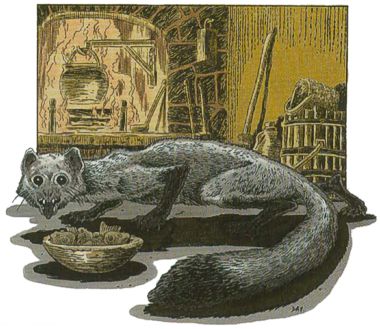

Dragon #269

| Climate/Terrain: | Any forest |
|---|---|
| Frequency: | Rare |
| Organization: | Solitary |
| Activity Cycle: | Night |
| Diet: | Carnivore |
| Intelligence: | Semi- (3) |
| Treasure: | Nil |
| Alignment: | Neutral |
| No. Appearing: | Variable |
| Armor Class: | 4 |
| Movement: | 18 |
| Hit Dice: | 1+1 |
| THAC0: | 19 |
| No. of Attacks: | See below |
| Damage/Attack: | 2-4 (1d3+1) |
| Special Attacks: | See below |
| Special Defenses: | Musk |
| Magic Resistance: | Saves as 4th-level fighter |
| Size: | S (3' long) |
| Morale: | Champion (16) |
| XP Value: | 35 |
The Forest gnome fisher is a domesticated version of the animal of the same name. The forest gnome name, stoght, sounds more like a cough than a word and means “guardian” or “warrior”. The fisher is a member of the weasel family and has been bred by forest gnomes for its fierceness and loyalty.
The fisher looks like a large ferret or small fox and can measure up to 3 feet along, one third of which is its bushy tail. No one knows how it earned its name, as fish play only at small role in its diet. It has the short legs and slender body of the weasel clan, and its silky, sleek fur can range from gray or dark brown to almost black. The feet and tail tip are always black, and some areas are peppered with white-tipped hairs that give the animal a frosty look. Its fur is much valued by trappers, and forest gnomes play a large part in keeping these animals from being hunted to extinction.
Fishers are remarkably quick and agile, and the kind bred by forest gnomes is clever as well. Their senses are keen, so they are rarely caught by surprise (roll of 1 on 1d10). Fishers are also as comfortable in the trees as on the ground, where, with their high agility and ability to make tremendous leaps (up to 18 feet), they can travel as quickly as they do on land. Stoghts are also strong swimmers. Young forest gnomes sometimes take turns riding on the family fisher, but adult gnomes are much too big for that activity.
Combat: As a fighter the fisher is impressive. Reports of fishers defending forest gnome families against all sorts of large creatures are not exaggerated. Natural animals, even those much larger than the fisher, are frightened by his ferocity. The fisher snarls and hisses, arching its back and stamping its feet. Faced by the display, any natural animal must make an immediate morale check at a -2 penalty. Failure means that the animal is intimidated and chooses to flee.
The fisher's tremendous speed in combat makes it difficult to hit, and its high Dexterity gives it a -2 modifier to its initiative rolls. Although it has only at bite attack, a stoght can attack twice per round. If the situation requires, the fisher can also use its musk. The fisher rolls to hit, ignoring armor; if successful, the target must make a saving throw vs. poison or be incapacitated for 1d4 rounds. The fisher usually uses this time to renew its attacks with added ferocity.
If defending its young or a forest gnome family, the fisher fights to the death.
Habitat/Society: The fisher is a solitary animal, though some forest gnome families keep more than one as pets or guards. It lives in most forests, although the animal is quite rare, especially the wild variety. It prefers the coniferous forests that grow at high altitudes, but it also likes lowland deciduous forests, as long as they are dense.
A stoght’s diet consists of rabbits, rats, weasels, birds, mice, raccoons, fish, and the occasional nuts and berries. It also eats carrion, either stored or a dead animal it has happened upon. A fisher especially loves to eat porcupine, which it flips over on its back, attacking the soft underbelly. Forest gnomes usually let their fishers hunt for their own meals.
The gestation period is actually delayed after mating, and the stoght cubs don't appear for a full year. The litter ranges from one to five cubs. They are weaned at 7 weeks, hunting at 3 months, and on their own at 6 months.
Ecology: The fisher is a rare animal, and if not for the forest gnomes would be rarer still. It is prized for its fur, the female more than the male, although her pelt is nearly half the size. Any trapper foolish enough to kill a fisher, however, runs the risk that a vengeful forests gnome will be laying for the trapper the next time he or she enters the forest.
